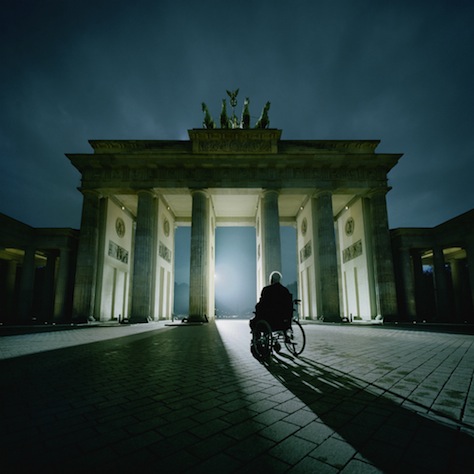 Photo credit to Andreas Mühe/VG Bild-Kunst Bonn for BILD.
Photo credit to Andreas Mühe/VG Bild-Kunst Bonn for BILD.
This is perhaps the most haunting photo in world politics in 2014.![]()
Helmut Kohl, who was first elected chancellor of West Germany in 1982 and who left office in 1998 following his final term as the chancellor of a reunified Germany, is today long out of frontline politics and, since a 2008 stroke, has been confined to a wheelchair. He sits alone in this photo for Bild at night in the glow of the Brandenburg Gate, one of many points that divided East Berlin from West Berlin for the better part of 28 years.
It’s astonishing that, with Sunday’s 25th anniversary of the fall of the Berlin Wall, which ultimately resulted in the reunification of Germany and became a harbinger of the collapse of the Soviet Union, we’ve almost reached the point where the Berlin Wall has been down longer than it initially stood.
Even as Mikhail Gorbachev, still around as an icon of the revolutionary change of that era (and despised, to this day, in Russia), is warning that Ukraine could spur a new 21st century cold war, Sunday was an opportunity to celebrate the universal desire for freedom. That was as true in 1989 as it is in 2014, when many walls still remain, from Gaza to China’s ‘great firewall.’
For Germany, the reunification of East and West has been very successful in some ways, others not. It’s almost comical today to imagine British prime minister Margaret Thatcher telephoning Gorbachev, frantically and practically begging him to stop German reunification. But when we think about the chiefly German-led European Union of 2014, with its emphasis on tight budgets (instead of GDP and jobs growth) and its peculiarly German reticence as regards debt and inflation (even in the face of growing deflationary pressure), there may have been something to Thatcher’s warnings, after all. Ulrich Beck captures the peculiar problem of German Europe in a new short book, translated earlier this summer into English.
* * * * *
RELATED: Has the first Ossi chancellor been good or bad
for the former East Germany?
* * * * *
German reunification is itself something of a cautionary tale about the perils of implementing a currency union in what, in 1990, was most certainly not an optimal currency zone. Though the past 25 years haven’t been horrific for the six eastern German states that once constituted the German Democratic Republic, it’s hard to say that the former GDR has done better than Poland or other former ‘Iron Curtain’ countries. That, in part, may have been due to the effects of conversion of East German currency on a 1:1 ratio with the West German deutsche mark.
The East German / reunification example should have taught Europeans important lessons about the perils of jumping too hastily into a continent-wide currency union, and there are important parallels between the economic struggles of eastern Germany over the last 25 years and the current struggles that Spain, Italy, Greece and other eurozone countries now face. If east Germans struggled in the 1990s and 2000s under the constraints of the Bundesbank’s monetary policy, southern European economies are struggling even more EU-wide monetary policy, which still veers much more to the German mindset on debt and inflation, despite the best efforts of European Central Bank president Mario Draghi.
No one ties together the two stories more than Kohl, who jumped at he opportunity to reunify Germany (and the political benefits he reaped from doing so). But, along with the late French president François Mitterand and former European Commission president Jacques Delors, Kohl is one of the chief architects of today’s European Union, including the monetary union that came into existence with the 1992 Maastricht Treaty.
Kohl, despite his advanced age and frail health, recently released a new book on Europe, though he remains something of an isolated statesman within Germany these days. In a newly published series of interviews, Kohl was recently quoted trashing Merkel’s social graces, ranting that she ‘couldn’t even hold her fork and knife properly.’ More recently, Kohl blamed his social democratic successor, Gerhard Schröder, for the current eurozone crisis by allowing Greece to join the single currency and for allowing European governments to elude Maastricht’s original budgetary rules. Wolfgang Schäuble, once Kohl’s closest ally and protégé (until the two had a falling-out over Schäuble’s hope to become chancellor in his own right), is now in his second term as Germany’s powerful finance minister, whose views carry weight not only throughout Europe, but across the Atlantic. Almost immediately after leaving office, Kohl was implicated in a scandal involving illegal political campaign donations to his center-right CDU. Three years later, his wife of over four decades committed suicide. Since his stroke six years ago, Kohl has been partially paralyzed, with limited speech ability.
All of which makes the Bild image, highlighting Kohl’s physical isolation, so spectacularly evocative.